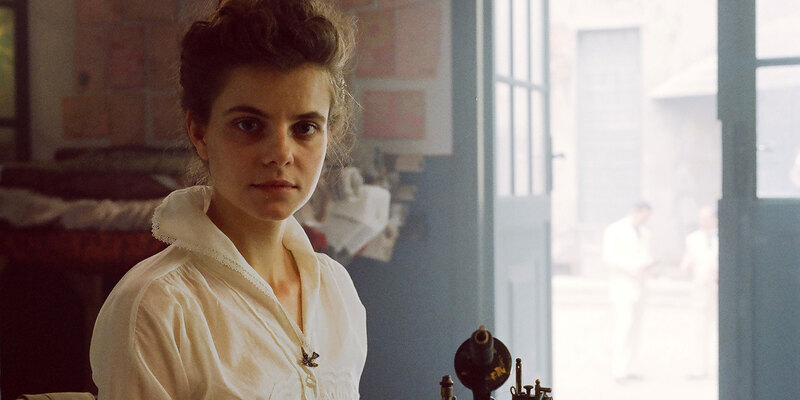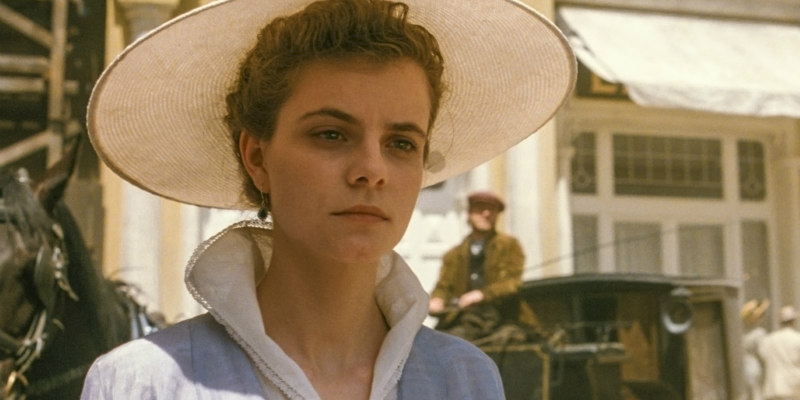
In 1910 Budapest, a young woman uncovers a conspiracy revolving around
the department store once owned by her family.
Review by
Eric Hillis
Directed by: László Nemes
Starring: Juli Jakab, Vlad Ivanov, Evelin
Dobos, Susanne Wuest

In this age of Amazon and shuttered high streets, it's easy to forget the role department stores once played in the lives of cities. As a child in the 1980s, my mother would drag me around the vast, multi-storied stores of Dublin, all of which proudly bore the names of the families that founded them, the closest Ireland of the 20th century had to a monarchy, the new High Kings of capitalism. My mother never purchased anything in these stores - they were way beyond our budget - but for her a visit to a department store was an aspirational glimpse of how the other half lived. For myself, even at that young age, it was an early lesson in the prejudicial dynamic of the classist society I was to grow up in, as security guards subtly shadowed us around the store once they heard our working class accents.
With his second feature film, Hungarian filmmaker László Nemes has tapped into this idea of the department store as a sinister representation of materialism. In his fictional version of 1910 Budapest, the dominant department store is 'Leiter's', known primarily for the hats it supplies to the aristocracy of the Austro-Hungarian empire. Leiter's is a metaphorical gate to hell, Budapest's equivalent of Suspiria's ballet academy, and just as deadly for the young women who find themselves in its grasp.

One morning a young woman arrives at the store, wishing to apply for the position of a milliner. Her designs impress Zelma (Evelin Dobos), the store manager, but when the budding applicant reveals that she is Írisz Leiter (Juli Jakab), estranged daughter of the store's founders, who died mysteriously in a fire some years back, the store's new owner, Oszkár Brill (Vlad Ivanov), refuses to employ her.
[
READ MORE: New Release Review - Small Body
]
It seems Írisz's interest in the job is merely a front for a quest to learn the truth regarding her parents' fate. As she sticks around Budapest, she picks up tidbits of information about the Leiter dynasty, including the existence of a brother she never knew she had. Írisz's pursuit of the truth takes her on a dangerous journey across the Hungarian capital, encountering the upper and lower echelons of society and uncovering various political plots along the way.

You know how every detective movie opens with a mysterious and beautiful woman asking the detective for his help? Well, imagine if that mysterious and beautiful woman instead decided to cut out the middleman and conduct her own investigation. That's essentially the core setup of Nemes's film. The plot, like most detective stories, is labyrinthine, and it's easy to lose track, especially given how many beautiful visual distractions are on offer. The plot may not even stand up to scrutiny, a reminder that Howard Hawks and his screenwriters famously confessed to being completely baffled by the plot they wove themselves in The Big Sleep. But as with most detective movies, the plot is the least interesting element here, and if you've seen Twin Peaks you'll recognise it as a riff on one of that show's subplots.
It seems Írisz's interest in the job is merely a front for a quest to learn the truth regarding her parents' fate. As she sticks around Budapest, she picks up tidbits of information about the Leiter dynasty, including the existence of a brother she never knew she had. Írisz's pursuit of the truth takes her on a dangerous journey across the Hungarian capital, encountering the upper and lower echelons of society and uncovering various political plots along the way.

You know how every detective movie opens with a mysterious and beautiful woman asking the detective for his help? Well, imagine if that mysterious and beautiful woman instead decided to cut out the middleman and conduct her own investigation. That's essentially the core setup of Nemes's film. The plot, like most detective stories, is labyrinthine, and it's easy to lose track, especially given how many beautiful visual distractions are on offer. The plot may not even stand up to scrutiny, a reminder that Howard Hawks and his screenwriters famously confessed to being completely baffled by the plot they wove themselves in The Big Sleep. But as with most detective movies, the plot is the least interesting element here, and if you've seen Twin Peaks you'll recognise it as a riff on one of that show's subplots.
[
READ MORE: New Release Review - The Outfit
]
What makes Sunset such a rewarding experience is the incredible immersiveness of its world building. I'm not sure who is funding recent Hungarian movies, but Sunset joins Kornél Mundruczó's White God and Jupiter's Moon as the most expensive looking productions to come out of Eastern Europe since the heyday of communist propaganda epics. The recreation of pre-WWI Budapest is so staggeringly convincing that it's difficult to believe the movie was shot a century later. It's the sort of lavish period epic you feel Hollywood was on the verge of producing before Heaven's Gate flopped.

Perhaps what enhances the film's verisimilitude is how Nemes never calls attention to his film's incredible production design. As with his debut, the acclaimed but uncomfortable Holocaust drama Son of Saul, Nemes once again makes his protagonist the fulcrum of his storytelling. The camera is always either staring into the unblinking face of Írisz (and what a face it is!), following her from behind, or panning to take in her point of view. I found this technique problematic in Son of Saul, as while it was initially immersive it ultimately took me out of the story, but applied to the investigative narrative here, it proves a natural fit. As Írisz is dragged further into the labyrinth the film continuously constructs, so too are we the audience, new information hitting us at a rate we can barely process as chaos often fills the edges of the frames.
Nemes's technique reminded me of the famous single take heist sequence of Joseph H. Lewis's Gun Crazy - we're at once a passive observer of and complicit in the actions of Írisz, and Nemes's ability to create suspense by giving the audience information his protagonist isn't privy to - even though she's present in the same shot! - is quite ingenious. Much of this is achieved through the one advantage the viewer holds over Írisz - historical knowledge. While the innocent Írisz is a deer in the headlights taken aback by the plots she uncovers, we know what's just around the corner for Europe. We can't warn Írisz of what's to come, but in the film's closing shot she stares back at us accusingly, as if to warn us that history may be on the brink of repeating itself.
What makes Sunset such a rewarding experience is the incredible immersiveness of its world building. I'm not sure who is funding recent Hungarian movies, but Sunset joins Kornél Mundruczó's White God and Jupiter's Moon as the most expensive looking productions to come out of Eastern Europe since the heyday of communist propaganda epics. The recreation of pre-WWI Budapest is so staggeringly convincing that it's difficult to believe the movie was shot a century later. It's the sort of lavish period epic you feel Hollywood was on the verge of producing before Heaven's Gate flopped.

Perhaps what enhances the film's verisimilitude is how Nemes never calls attention to his film's incredible production design. As with his debut, the acclaimed but uncomfortable Holocaust drama Son of Saul, Nemes once again makes his protagonist the fulcrum of his storytelling. The camera is always either staring into the unblinking face of Írisz (and what a face it is!), following her from behind, or panning to take in her point of view. I found this technique problematic in Son of Saul, as while it was initially immersive it ultimately took me out of the story, but applied to the investigative narrative here, it proves a natural fit. As Írisz is dragged further into the labyrinth the film continuously constructs, so too are we the audience, new information hitting us at a rate we can barely process as chaos often fills the edges of the frames.
Nemes's technique reminded me of the famous single take heist sequence of Joseph H. Lewis's Gun Crazy - we're at once a passive observer of and complicit in the actions of Írisz, and Nemes's ability to create suspense by giving the audience information his protagonist isn't privy to - even though she's present in the same shot! - is quite ingenious. Much of this is achieved through the one advantage the viewer holds over Írisz - historical knowledge. While the innocent Írisz is a deer in the headlights taken aback by the plots she uncovers, we know what's just around the corner for Europe. We can't warn Írisz of what's to come, but in the film's closing shot she stares back at us accusingly, as if to warn us that history may be on the brink of repeating itself.

Sunset is on MUBI UK now.
